I used to think that I had grit. I’m resourceful and capable of solving problems and blazing my own trail. And then I met Quincy Henry and learned what real grit looks like.
This story was made with support from Sawyer Products
Quincy and Whitni Henry own Campfire Coffee Co. – a wood-fired coffee roaster and shop in Tacoma, Washington. They don’t use fancy machines or gadgets to roast their coffee. The magic that ends up in your coffee cup is the result of wood, fire, smoke, and some of that grit. They roast by feel and sound using custom-designed steel fireboxes.
Quincy is a northwest native, growing up in Washington near Tacoma – about 45 minutes south of Seattle. He’s a bit of a renaissance man. He’s a Grammy-nominated rapper, a one-time PhD candidate, has a Masters in marketing, oh, and he’s a husband, dad, and business owner.
As a rapper, Quincy went by the name Q Dot. In 2009 his song Froglegz N Fishgrease was nominated for a Grammy. He lost the award but gained notoriety for the nomination which helped keep him on the road.
The finality of Quincy’s music career was cemented with the birth of his third child in 2016. He tells me that while he was continually building an audience and making a good living, the obligations at home came faster than his successes on stage. And while he knew the end of that chapter was near, he still managed to earn a paycheck by performing at a local venue on the same day his youngest child was born. He told me that he was trying to provide for his family.
Quincy’s Masters in marketing helped secure a job and partnership with a small Seattle-based marketing agency. The steady paycheck was a welcomed relief from the sporadic payouts that Quincy collected when he was a rapper. Life was good.
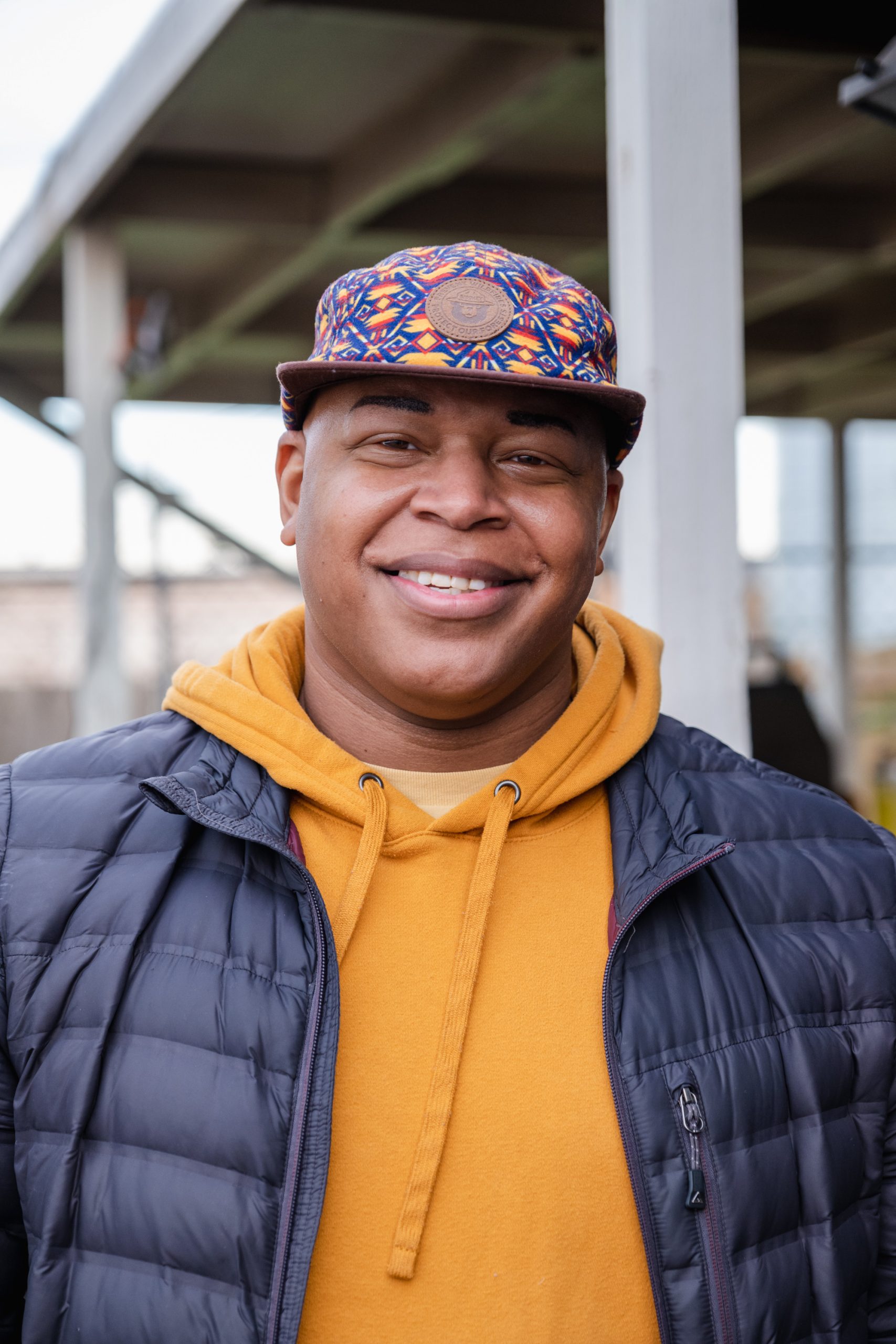
In 2017, Quincy was bought out by his partners in the agency, leaving him without a job. Whitni was also recovering from a work-related injury that left her unable to work. With a family to support, it was time to reinvent themselves.
Quincy tells me that the coffee shop was Whitni’s dream. On the drive home to Washington from Utah after visiting family, the couple laid out their plans for what would become Campfire Coffee Co.
They worked out what would make their shop different. Both Quincy and Whitni love to camp and explore the Pacific Northwest. An outdoor theme was a no-brainer for them, but translating that into something authentic that would resonate with people took more than mountains and trees in their logo.
“We love to camp and hike. All of those super casual outdoor activities. We started talking about all of our times at parks and campgrounds. And it’s like, yo, we tend to find that there’s usually a certain type of person at a campground. And it’s somebody that can afford to be there. They can afford the gear. And usually, that person is a 40 year old white dude. Possibly with his family or friends. That wasn’t the whole landscape but out of the countless trips we had taken around the state camping and hiking, that’s what we kind of saw. So we thought - what if we made this thing where it’s not just an outdoors-themed shop? We’re not just inspiring and encouraging people to get into the outdoors. But we make part of our work to remove barriers for other people to get out and enjoy what I’ve come to learn is the true American past-time. The outdoors.”
Quincy Henry, Campfire Coffee Co.
But before they could remove those barriers for people in the outdoors, Quincy needed to brush up on his coffee culture. Before becoming successful wood-fired coffee roasters, Quincy and Whitni were buying generic flavored coffee pods in bulk. Making coffee around the campfire was always part of their outdoor experiences, but at home, they drank what was convenient for them. Quincy contacted a friend who was managing a Starbucks near his house and asked for a part-time job. He wanted to learn the ins and outs of being a barista.
There’s a love-hate relationship between Starbucks and those of us who love our coffee and live in the Northwest. You can trash Starbucks all you want, but Quincy recognized the opportunity to learn about the retail side of the coffee business by working at Starbucks. I think we can all agree that Starbucks seems to know how to sell coffee.
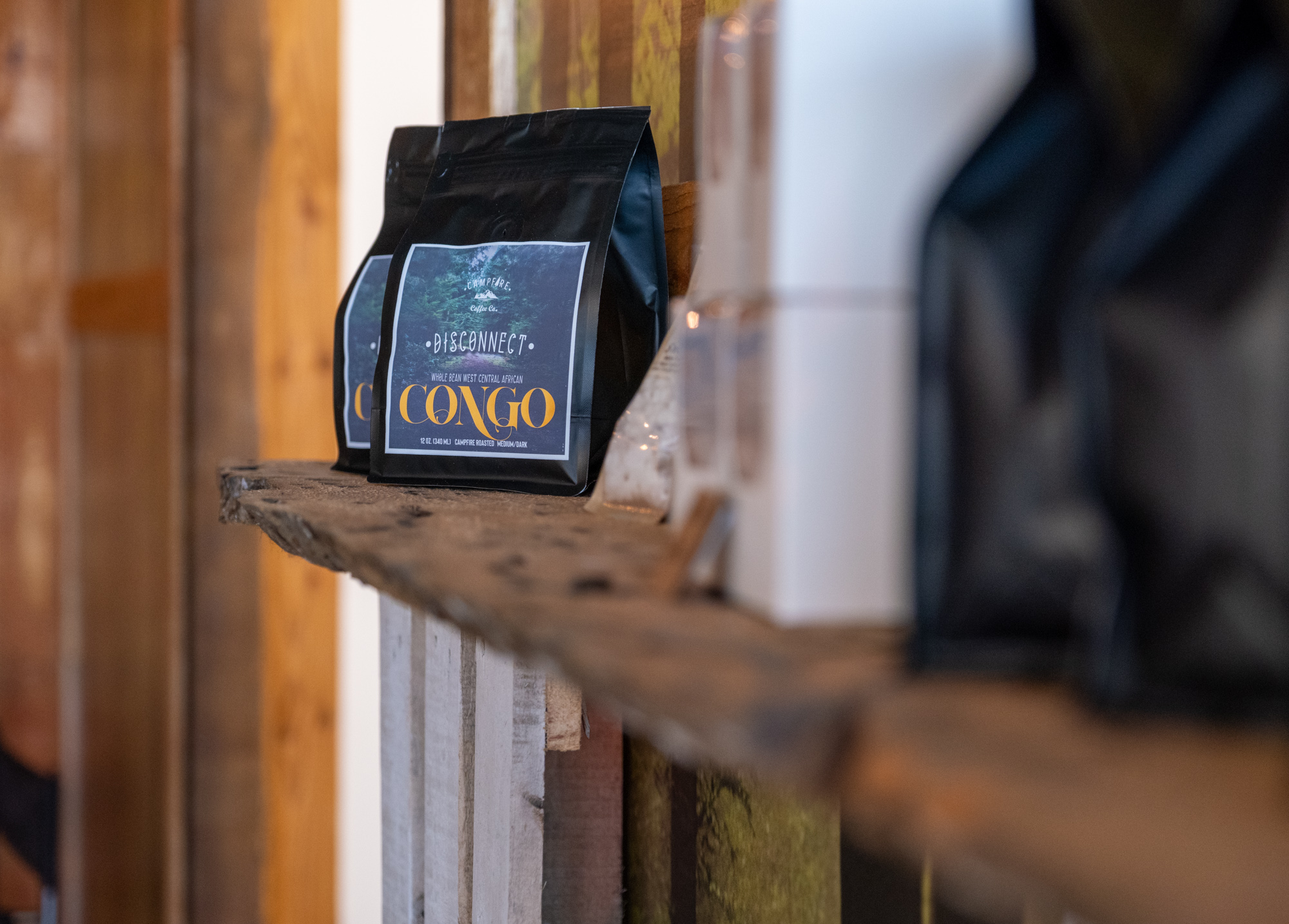
Roasting coffee was not part of the original plan for Campfire Coffee Co. Quincy and Whitni wanted to open a coffee shop and sell merchandise.
Most coffee shops work with roasters to supply them with freshly roasted coffee. Quincy tells me that they contacted countless roasters who all sang versions of the same song. Quincy initially hesitates to say that the roasters they contacted blew him off, but then quickly acknowledges that they did do just that. Part of the problem may have been due to the smaller order of beans that Campfire initially needed. Coffee roasters rely on steady contracts with retailers to keep their doors open. An order from one small coffee shop could be a drop in the bucket for a larger roaster, depending on who you ask.
“I’ll never forget. I remember this clear as day. We were sitting on the couch in the living room. My wife was talking to her sister in Texas. Her sister asked if we had thought about roasting our own coffee. We told her no, we haven’t. She said that she knew we camped a lot and made coffee. She was wondering if we could just make your own coffee because there’s a roaster in Texas that roasts their beans in a pizza oven with wood.”
Quincy Henry, Campfire Coffee Co.
Using fire to roast coffee made sense to Quincy. He previously worked in a barbecue pit and understood the relationship between wood, fire, and food. Whitni ordered 20 pounds of green beans to test with and Quincy started to experiment with a popcorn popper over their fire pit. He explains that the first test batches were bad. But he quickly learned to keep the beans moving during the roast to stop them from burning. Eventually, Quincy turned out a batch that was smokey and tasty. The couple started sharing their roast with friends – always refining their process.
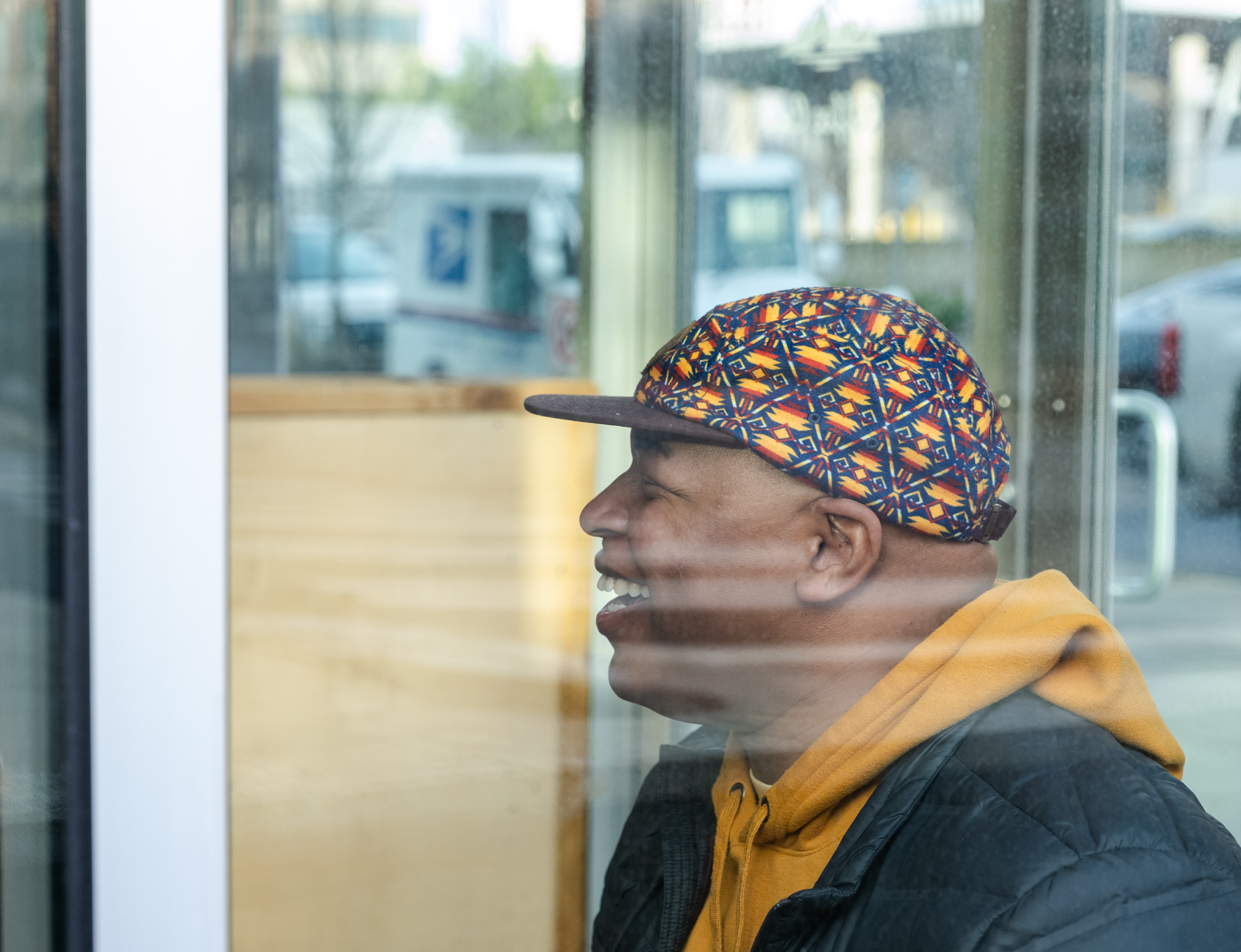
Figuring out how to roast coffee over an open fire solved their supply issue and gave Campfire a great hook for new customers. Creating the space for their new community was next on their list.
In 2019, Quincy and Whitni found a retail space near the University of Washington campus in downtown Tacoma. Construction started that year and kicked off a series of obstacles and headaches that would delay their opening and also reveal new opportunities.
First, wood framing was used in the new retail space instead of the required metal framing. Inspectors ordered all of the wood framing to be replaced. Next, the plumbing had to be redone when an inspector spotted mistakes by the plumber.
Drywall started in January 2020 when early rumblings of Covid-19 were spreading across the world. The drywall crew would eventually abandon their job with Campfire, leaving Quincy to finish the job on his own. And on top of all of that, Quincy and Whitni ran out of tenant improvement money – the funds from their landlord to renovate the space – in March of 2020 as Washington state shut down due to Covid. Campfire was on the brink of failure before the idea ever saw the light of day. But, do you remember that grit that I mentioned at the beginning of this story?
Through their trials, Whitni and Quincy shared their wins and losses on social media. Their honesty and vulnerability helped build a connection to their growing following. People were rooting for them. Quincy had shared the news on social media about all of the work that still needed to be done in the retail space. His neighbor saw the post and offered to contact his step-dad, a former contractor who was looking for work. That connection helped see the renovations over the finish line.
With a new contractor on board and renovations underway, Campfire’s online store launched on March 27th, 2020. They sold out of coffee and merchandise within hours of the launch. Every Friday they would load products onto their website, and every week they would sell out. They increased coffee production to keep up with demand and continued to craft their merch by hand. Quincy estimates that by fall 2020, they had sold over 10,000 pieces of merchandise and several thousand bags of coffee.
Finally, on August 17th, 2020, after plenty of sweat and real equity, Whitni and Quincy opened the doors to Campfire Coffee Co.
“The Tacoma community played such a big role in getting us off the ground. I think it's because we weren’t afraid to share the story...the good and the bad. We would share all of the wins and all of the losses. I was posting on Facebook, Instagram, and Twitter trying to find help. Trying to find resources. Does anybody know somebody that can help us do something? I think that really resonated with people. People saw that we got kicked in the throat with contractors, and then we got gut-punched with the pandemic which put everything to a halt. That brought a lot of people to the online store. They were supporting us.”
Quincy Henry, Campfire Coffee Co.
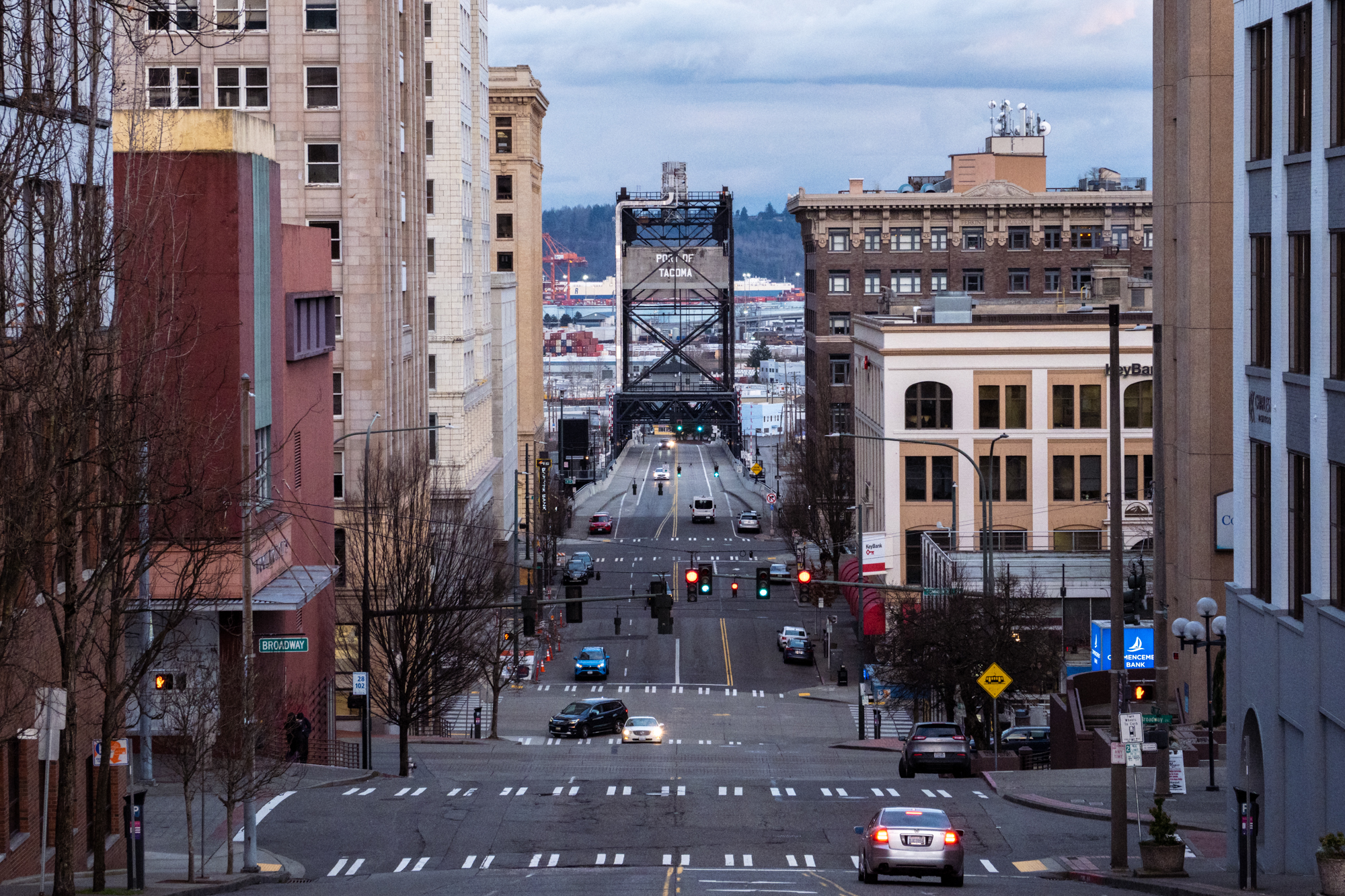
The Explorers Club is a non-profit that’s part of the Campfire family. Quincy says it’s the vehicle they use to fulfill their mission to make the outdoors more accessible to everyone. Before Covid, they would use Campfire’s retail space to host meetings and clinics for the Explorers Club. When the state shut down, they shifted their focus away from in-person meetings to supporting other organizations that share their mission.
According to the most recent impact report, the Explorers Club raised $20,000 for outdoor education and youth organizations and awarded five fully funded camping trips to families. This was all during a turbulent startup with limited resources.
In 2022, Whitni and Quincy plan to focus on the Explorers Club’s internal structure and resources. They still plan to help raise money for local organizations, but they want to get back to helping more people experience the outdoors. Part of that goal is building up a supply of gear they can rent out or give away to people who don’t have supplies to go camping or backpacking. Contact Campfire directly to make a gear donation to the Explorers Club.
Sawyer provides innovative water filtration solutions, sun, and bug protection products for all types of outdoor enthusiasts. They’re working to provide clean water all over the world through 140 charities in 80 countries. Sawyer is also using their influence for good in Ukraine. The company donated 30,000 water filtration systems to several organizations that provide support for Ukrainian refugees.
We shared Whitni and Quincy’s story, and their work through the Explorers Club, with our friends at Sawyer. Safely treating drinking water is a crucial part of an extended stay in the outdoors. Thanks to a generous donation from Sawyer, the Explorers Club now has a full supply of filters, sunscreen, and bug repellent to help carry out their mission to make the outdoors more accessible to everyone.
Every Sawyer product you buy is a contribution to our common humanity, bringing clean water programs to people in need domestically, internationally, and in disaster relief missions all around the world. We are 10+ years into relief programs and are very fortunate to work with over 140 charities in 80 countries, touching (and saving!) the lives of millions of people every year.
Sawyer. We’re More Than an Outdoor Company.
Visit Sawyer.com for more
While preparing for this story, I read everything I could find about Campfire Coffee Co. A lot of the stories I found were positioned with race, front and center. That’s not a bad thing. But I wondered how Quincy felt about that. He estimates that Campfire is one of 20 black owned coffee roasters in America. Race wasn’t a big part of Campfire’s identity when Quincy and Whitni formed the company, but it quickly evolved into a larger discussion as more people learned about their story.
“Right around when George Floyd was happening, we got to be on all of these black owned business lists and all this stuff. And, I’m not going to lie man, I kind of was a little uncomfortable about it to a degree. Because at first I didn’t want to just be the black owned coffee company. Right? But I also personally take issue with people who push against that. Like, why do you push against the door that people want to open? You’re looking for new customers. You’re going to need them during this time especially. If they found you on a black owned business list, cool. And then show them why they need to continue to shop with you. Don’t just keep going back to the black owned business thing.”
Quincy Henry, Campfire Coffee Co.
I asked Quincy if he thought that there was too much focus on his race. He laughed and said, “I don’t know. I don’t know if it’s too much because I don’t have my race-o-meter handy.” But he relates that there could be some overcorrections happening. Quincy quickly recalls a jarring email he once received from a customer. The customer explained that they were already supporting one black owned coffee roaster and they’re looking for another. Thinking back on that email, he said, “I’m not your pet. There isn’t a quota. Do you like the coffee?” He never responded to the email.
Quincy understands that a lot of their customers might find them through black owned business resources. Race might be one of the paths that bring in customers. But he also believes that it’s his job to make sure they come back for another coffee.
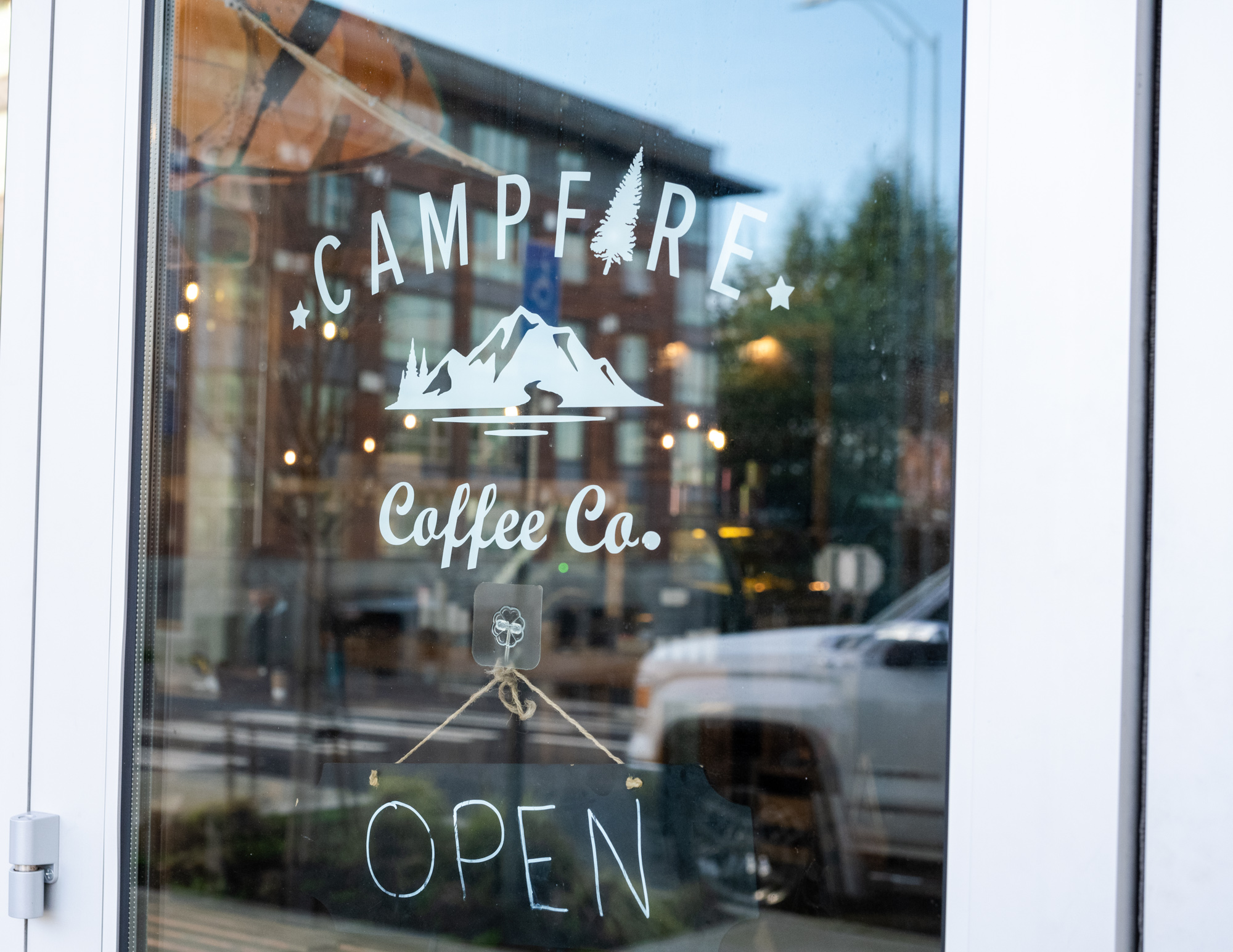
By all accounts, the future of Campfire Coffee is burning bright. Their coffee is now available at Trader Joe’s. Quincy tells me that they’re not interested in expanding just to grow the business. Campfire plans to expand with purpose to ensure they can still support their communities and fulfill their mission.
In the summer of 2021, Whitni and Quincy bought one acre of agricultural land in Hawaii. They’re planning to grow their own Kona coffee to help offset future price increases on certain types of coffee strains due to climate change.
Quincy is disarming and easy to talk to. He’s humble and proud of the company and community that he and Whitni have built. I first met Quincy in person a few weeks before our interview for this story. I like to get a little face time with people ahead of an interview so I can get to know them. That brief connection can go a long way in an interview that’s filled with personal questions. Our first meeting was at Campfire’s Tacoma shop near closing time. Quincy and I carved out 30 minutes to talk about the boundaries of this story. Nearly three hours later, we were still talking.
There are plenty of good reasons to support Campfire Coffee Co. Yes, Campfire is a black owned coffee roaster, but it’s also a female and veteran-owned roaster. Their passion for making the outdoors accessible to everyone has raised thousands of dollars for local organizations. And, roast tasty and unique coffee. Just to name a few.
Grit and determination helped Quincy and Whitni evolve from coffee novices to talk-of-the-town wood fired coffee roasters. A long and expensive tangle of obstacles nearly derailed their dream, but Tacoma wouldn’t allow the Henrys to fail. They built Campfire Coffee Co. from the ground up, and Tacoma responded with love. Visit them in downtown Tacoma or at welovecampfire.com and experience the love for yourself.
Whitni Henry is a co-owner of Campfire Coffee Co. and a veteran. Whitni was not present for the interview portion of this story. However, Quincy repeatedly acknowledged her contributions. Because our interview involved Quincy only, we chose to limit the focus of the story to Quincy’s perspectives.